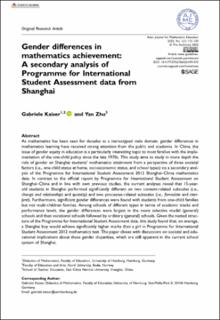| dc.contributor.author | DR Kaiser, Gabriele Agnes Hildegard | |
| dc.contributor.author | Zhu, Yan | |
| dc.date.accessioned | 2023-03-01T09:00:30Z | |
| dc.date.available | 2023-03-01T09:00:30Z | |
| dc.date.created | 2023-02-20T10:08:32Z | |
| dc.date.issued | 2022 | |
| dc.identifier.citation | Kaiser, G. & Zhu, Y. (2022). Gender differences in mathematics achievement: A secondary analysis of Programme for International Student Assessment data from Shanghai. Asian Journal for Mathematics Education, 1(1), 115-130. doi: | en_US |
| dc.identifier.issn | 2752-7271 | |
| dc.identifier.uri | https://hdl.handle.net/11250/3054857 | |
| dc.description.abstract | As mathematics has been seen for decades as a stereotyped male domain, gender differences in mathematics learning have received strong attention from the public and academia. In China, the issue of gender equity in education is a particularly interesting topic to most families with the implementation of the one-child policy since the late 1970s. This study aims to study in more depth the role of gender on Shanghai students’ mathematics attainment from a perspective of three societal factors (i.e., one-child status at home, socioeconomic status, and school types) via a secondary analysis of the Programme for International Student Assessment 2012 Shanghai–China mathematics data. In contrast to the official report by Programme for International Student Assessment on Shanghai–China and in line with own previous studies, the current analyses reveal that 15-year-old students in Shanghai performed significantly different on two content-related subscales (i.e., change and relationships and quantity) and two processes-related subscales (i.e., formulate and interpret). Furthermore, significant gender differences were found with students from one-child families but not multi-children families. Among schools of different types in terms of academic tracks and performance levels, the gender differences were largest in the more selective model (general) schools and then vocational schools followed by ordinary (general) schools. Given the nested structure of the Programme for International Student Assessment data, this study found that, on average, a Shanghai boy would achieve significantly higher marks than a girl in Programme for International Student Assessment 2012 mathematics test. The paper closes with discussions on societal and educational implications about these gender disparities, which are still apparent in the current school system of Shanghai. | en_US |
| dc.language.iso | eng | en_US |
| dc.publisher | Sage | en_US |
| dc.rights | Navngivelse-Ikkekommersiell 4.0 Internasjonal | * |
| dc.rights.uri | http://creativecommons.org/licenses/by-nc/4.0/deed.no | * |
| dc.title | Gender differences in mathematics achievement : A secondary analysis of Programme for International Student Assessment data from Shanghai | en_US |
| dc.type | Peer reviewed | en_US |
| dc.type | Journal article | en_US |
| dc.description.version | publishedVersion | en_US |
| dc.rights.holder | © 2022 The Authors | en_US |
| dc.source.pagenumber | 115-130 | en_US |
| dc.source.volume | 1 | en_US |
| dc.source.journal | Asian Journal for Mathematics Education (AJME) | en_US |
| dc.source.issue | 1 | en_US |
| dc.identifier.doi | 10.1177/27527263221091373 | |
| dc.identifier.cristin | 2127423 | |

